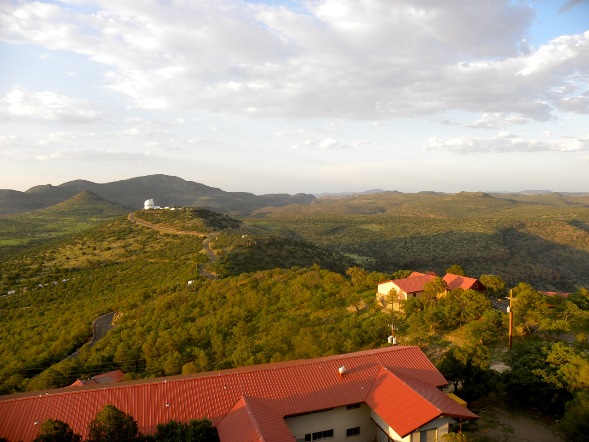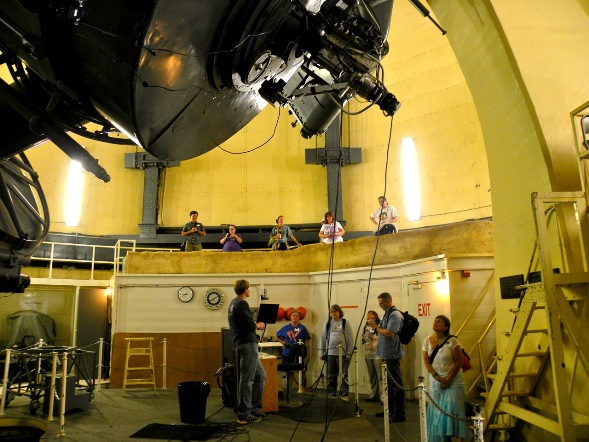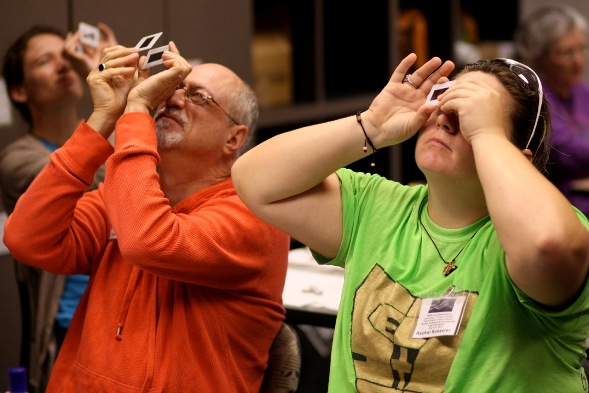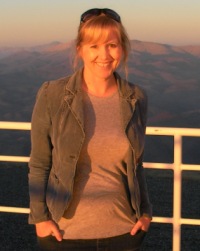by Keely Finkelstein
- Published: Friday, April 18 2014 08:18
What was the first thing in science that motivated you as a student? What experiences stick with you even until this day? For me getting hooked on astronomy started at a young age. I remember stargazing as a young child with my grandmother and having talks with her about stars and planets. She, who was an avid reader and astronomy enthusiast, gave me my first real memories related to science and helped ignite in me the drive to want to be an astronomer. From there, experiences at school coupled with visiting museums and summer science camps, all helped fuel my desire to go into science, specifically astronomy.
I am now in a career where I get to do real astronomy research on a regular basis, and also one where I can help both teachers and students foster and continue that same love for science that I have. There are great astronomy education programs world wide, and I am lucky to be a part of one through McDonald Observatory in rural west Texas. My predecessor, Mary Kay Hemenway, devoted many years to building McDonald Observatory's education programs, which run the gambit from student field experiences out at the observatory, to virtual field trips for entire classes of students to remotely tour the telescopes and interact with astronomy educators, and on to continuing education and professional development programs for teachers.
 View of the Astronomers Lodge (foreground) and the 9.2-meter Hobby Eberly Telescope in the distance
View of the Astronomers Lodge (foreground) and the 9.2-meter Hobby Eberly Telescope in the distance
One of the programs I am most actively involved in is our teacher training programs, where I work closely with our entire team of talented education staff at McDonald Observatory. Providing K-12 teachers with access to astronomy and space science resources and curricula is a core part of the work that McDonald Observatory does in astronomy education and outreach. We offer workshops where teachers get to come out and stay at the observatory, all while getting first hand training and access to new resources. Not only do the teachers get the first hand experience of performing all of the workshop activities -- putting themselves in the role of the students -- they also get one of a kind experiences, such as touring the research grade telescope facilities, and meeting and interacting with the scientists and engineers who live and work at McDonald Observatory. Our teacher participants also get to use many of the smaller telescopes out at McDonald Observatory.
 Teachers touring the 2.1-meter Otto Struve Telescope at McDonald Observatory
Teachers touring the 2.1-meter Otto Struve Telescope at McDonald Observatory
As we have seen time and time again, through teacher evaluations, these workshops are a valuable experience, and we offer scholarships for the majority of our workshops, relying on grant funding and private donations to provide this support. It is a humbling experience to be able to offer these types of training opportunities to teachers, one that I am so proud to be a part of. Without the scholarship funding we wouldn't be able to provide the opportunities that we do. I just wish we could do even more!
Another unique aspect of our teacher workshops is that they are often partnered with a parent research project, attached to a scientist's research grant. We therefore, tie in our workshop themes directly to the current research program that is being done by the scientists. For example, teachers will learn about exoplanets and perform activities related to this theme, all while making connections to state and national science standards. Then, on top of that, they will get exposure to some of the actual science and research problems on this topic directly from the scientists themselves. We accomplish this through interactions with the astronomers at the telescopes, and discussions with the principal researchers either in person or over video-conference. These direct interactions and conversations are often cited by the teachers as some of the top experiences from the entire workshop. Inspiring and motivating the teachers can leverage directly into new inspiration, motivation, and insight in to career opportunities for the students, once the teachers bring these experiences back to the classroom. For every teacher we interact with and train at a McDonald Observatory workshop, approximately 100 students per year will benefit from that teacher's training.
 Teachers experimenting with polarizers in a “Light & Optics” workshop
Teachers experimenting with polarizers in a “Light & Optics” workshop
At McDonald Observatory, we also strive to put other important aspects of successful professional development into our teacher workshops, two of those namely being: giving teachers time for personal reflection, and interactions with colleagues. Teachers aren't just getting lectured at by the experts, or only doing the activities, they also have time to reflect on them, thinking about what they themselves want to put to use, as well as having those same discussions (and more) with their colleagues. Both of these aspects, coupled with the hands-on approach of our workshops, and the direct interactions with scientists and science educators, are all tools that can help the growth of the teachers' skills, deepen their content understanding, and improve their confidence in teaching the material in the classroom. The successful outcome of these things can then directly impact the learning of hundreds of students in their classes. At times the funding climate can be challenging, and we can't offer as many scholarship workshops as we would like. But we are always looking for new ways to bring more experiences like these, for both teachers and students, to as many people as possible. McDonald Observatory is a unique place, situated in the rural mountains of west Texas, very different then many other areas of TX, and we try to make the astronomy education programs we offer as special as the place itself is. It is my hope that we will be able to continue to do this for many years to come.
###
 Keely Finkelstein is an astronomer and educator at the University of Texas at Austin, primarily working on many of the education programs through McDonald Observatory. Keely received her PhD at Arizona State University, and her research work focuses on star formation. She enjoys spending time with her family (her husband, two young children, and two fun loving dogs), especially taking advantage of all the great outdoor things to do in Austin, TX.
Keely Finkelstein is an astronomer and educator at the University of Texas at Austin, primarily working on many of the education programs through McDonald Observatory. Keely received her PhD at Arizona State University, and her research work focuses on star formation. She enjoys spending time with her family (her husband, two young children, and two fun loving dogs), especially taking advantage of all the great outdoor things to do in Austin, TX.
More information on the education programs and resources from McDonald Observatory can be found at:
http://mcdonaldobservatory.org/learn








Comments